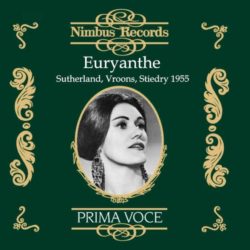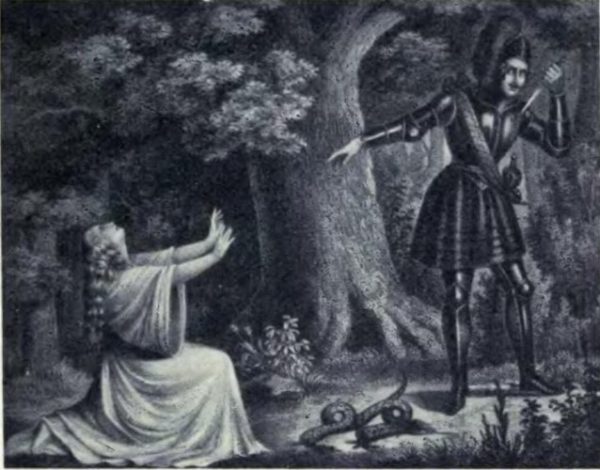Opera CD Review: A Young, Immensely Assured Joan Sutherland in Weber’s “Euryanthe”
By Ralph P. Locke
The oft-neglected “other” great opera by Carl Maria von Weber, splendidly performed in 1955 and in remarkably clear and vivid sound. I hope this opera’s day will yet come.
WEBER: Euryanthe
Joan Sutherland (Euryanthe), Marianne Schech (Eglantine), Frans Vroons (Adolar), Otakar Kraus (Lysiart), Kurt Böhme (King Louis VI)
BBC Chorus and Orchestra, conducted by Fritz Stiedry. Nimbus 7969 [2 CDs] 138 minutes
Click here to buy.

Euryanthe (1823) is one of the first and most important examples of a German Romantic Opera: works that, like French Grand Opera, tell a story, at length, from history or national legend and are sung throughout. (That is, they do not, unlike Singspiel, use spoken dialogue.)
It is rarely staged, even in German-speaking lands, and is thus one of the many wonders of the operatic repertoire for which music lovers have the phonograph (and CD player, etc.) to thank. Euryanthe was also Weber’s next-to-last opera, the last being Oberon (if it’s an opera: see my review). Indeed, Euryanthe clearly served as inspiration for Lohengrin in its pairing of a good couple (high-soaring lyric soprano and bright heroic tenor) undermined repeatedly by a scheming couple (consisting of a more emphatic soprano or mezzo and an irascible baritone).
What wonderful singers the BBC had access to in 1955! For this broadcast concert performance, the producers hired Joan Sutherland, then a young lyric-dramatic soprano; dramatic soprano Marianne Schech, already a major Wagnerian, despite a voice that was never quite beautiful; Frans Vroons, a now-forgotten Dutch tenor who had quite an international career singing largely French roles; Otakar Kraus, a lavishly gifted and dramatically keen bass-baritone, whose career I summarized in a review of Puccini’s Tosca; and Kurt Böhme, one of the best and most artful cavernous basses of the mid-20th century.
Under the lithe, flexible, yet tightly controlled baton of Fritz Stiedry, a regular at the Met and elsewhere, Weber’s opera here emerges as a coherent, forward-flowing masterpiece. The many colorful passages of woodwind and brass are strongly taken. The BBC Orchestra and Chorus perform at a level far above that of many 1950s opera-house ensembles. Here is an excerpt with a blazing Sutherland and the men’s chorus.
There are significant cuts to keep things moving smartly forward. This is utterly understandable for a pioneering recording from 1955. Even in the composer’s own day, the opera was described as too long and complicated. I have read that some 500 measures were often trimmed away (in part with Weber’s approval).
As a result, the opera here grips and gratifies. We care about the good couple and loathe the conniving pair. The French king Louis VI (the opera takes place in the 12th century) sounds an ethical norm as only a bass-voiced authority figure in opera can. Weber’s chorus comments frequently on the action and even intervenes in it, again as in the early Wagner operas (and in Meyerbeer, etc.). I particularly love the men’s chorus giving Adolar full support in his Act 1 cabaletta “Ich bau’ auf Gott und meine Euryanth’.” The two main virtuous characters get opportunities to display their high ethical standards, metaphorically, through passages of coloratura. All in all, this is a work that deserves stage productions, not just (as here) a first-rate concert performance.
The recording is one of some 1500 that a devoted at-home listener, Richard Itter, made, with state-of-the-art recording equipment, from BBC broadcasts in the years 1952-96, and that are being carefully remastered and released, most for the first time, by Lyrita or Nimbus (in this case, on the latter’s Prima Voce label). I find it astounding that the BBC did not keep the originals of many of these recordings (or else has not made them publicly available), but am delighted that the Lyrita Foundation has managed the tricky task of gaining permission from the BBC and the Musicians’ Union to release this rich trove for the pleasure and edification of music lovers everywhere.

Euryanthe’s forest scene with the serpent, performed at the Royal Theatre in Dresden with Wilhelmine Schröder-Devrient in the title role.
The 1974 studio recording conducted by Marek Janowski, with a starry cast (Jessye Norman, Rita Hunter, Nicolai Gedda, Tom Krause), offers plusher and more detailed sound, of course, and is fuller but apparently still not note-complete. It takes 3 CDs.
Other notable efforts at recording this somewhat ungainly score include one conducted by Ferdinand Leitner in 1954, with tenor Wolfgang Windgassen; and one conducted by Gerhard Korsten, at the Cagliari Opera Festival (described by one critic at American Record Guide as poorly sung; available also on DVD). I’ve seen mention of a 1949 recording with a young Walter Berry — one of my favorite baritones — as the evil Lysiart.
The present release gives a fine sense of what Weber could do, beyond Der Freischütz, and what he could have gone on to accomplish had he not died at age 39. The aforementioned ARG critic Kurt Moses reviewed an earlier CD release, on the Andromeda label, of this BBC performance and greatly admired it, only wishing that the sound didn’t fade in and out. (That inferior version is what is posted currently at YouTube, in its entirety — complete with fade-out during the overture.) Well, here it is now, in first-rate 1955 radio-studio mono, steady as a rock. A beautiful rock.
The synopsis lacks track numbers. The singer bios are helpfully detailed. No libretto, but on the Web I easily located the German text and (separately) a serviceable old translation.
I hope this opera’s day will yet come. It could provide welcome respite from the incessant productions of the same top-ten operas (e.g., La bohème, much as I love it).
Ralph P. Locke is emeritus professor of musicology at the University of Rochester’s Eastman School of Music. Six of his articles have won the ASCAP-Deems Taylor Award for excellence in writing about music. His most recent two books are Musical Exoticism: Images and Reflections and Music and the Exotic from the Renaissance to Mozart (both Cambridge University Press). Both are now available in paperback; the second, also as an e-book. Ralph Locke also contributes to American Record Guide and to the online arts-magazines NewYorkArts.net, OperaToday.com, and The Boston Musical Intelligencer. His articles have appeared in major scholarly journals, in OxfordMusicOnline (Grove Dictionary), and in the program books of major opera houses, e.g., Santa Fe (New Mexico), Wexford (Ireland), Glyndebourne, Covent Garden, and the Bavarian State Opera (Munich). The present review first appeared in American Record Guide and appears here by kind permission.
Tagged: Carl Maria von Weber, Euryanthe, Joan Sutherland, Nimbus, Prima Voce
